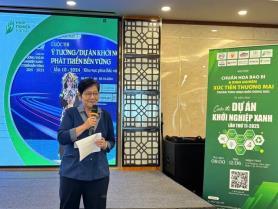Việt Nam’s digital economy development hinges on a skilled and robust workforce of professionals
Artificial Intelligence has gone from a science-fiction dream to a critical part of our everyday lives. Joel Garcia, Head of Technology, ASEAN, AMAZON Web Services (AWS), talks to Việt Nam News reporter Thu Vân about the potential of the adoption of AI across industries in Việt Nam in the near future.

Artificial Intelligence has gone from a science-fiction dream to a critical part of our everyday lives. Joel Garcia, Head of Technology, ASEAN, AMAZON Web Services (AWS), talks to Việt Nam News reporter Thu Vân about the potential of the adoption of AI across industries in Việt Nam in the near future.
How has AI changed your work and your industry?
Artificial Intelligence (AI) and Machine Learning (ML) are the most transformational technologies of our time. Which is why, for more than 20 years, Amazon has invested heavily in the development of AI and ML, infusing these amazing capabilities into nearly every business unit, making it accessible to anyone who wants to use it, including more than 100,000 customers of all sizes and industries. AWS has the broadest and deepest portfolio of AI and machine learning services at all three layers of the stack. This is why customers like Intuit, Thomson Reuters, AstraZeneca, Ferrari, Bundesliga, 3M and BMW as well as thousands of start-ups and government agencies around the world, and customers in Việt Nam such as Katalon and Movi are transforming themselves, their industries, and their missions with ML.
We take the same democratising approach to generative AI: we work to take these technologies out of the realm of research and experiments and extend their availability far beyond a handful of start-ups and large, well-funded tech companies.
Can you give a general assessment of the potential and development opportunities of AI as well as the adoption of AI across industries in Việt Nam in the near future?
AI has been a buzzword across sectors for the last decade, leading to significant advancements in technology and operational efficiencies. Among the emerging trends, generative AI, a subset of AI, has shown immense potential in reshaping industries.
Generative AI is a type of AI that can create new content and ideas, including conversations, stories, images, videos, and music. Like all AI, generative AI is powered by ML models—very large models that are pre-trained on vast amounts of data and commonly referred to as Foundation Models (FMs). While ChatGPT has been the first broad generative AI experience to catch customers' attention, most people studying generative AI have quickly come to realise that several companies have been working on FMs for years, and there are several different FMs available - each with unique strengths and characteristics.
With Amazon Bedrock, our latest serverless experience, customers can easily find the right foundation model (FM) for what they're trying to get done, get started quickly, privately customise FMs with their own data, and easily integrate and deploy them into their applications using the AWS tools and capabilities they are familiar with, without having to manage any infrastructure.
It’s exciting how customers will be able to apply generative AI across all lines of business including engineering, marketing, customer service, finance and sales, and for many use cases from text summarisation to image generation. A broad range of customers from healthcare like 3M and Philips to financial services like BBVA are already working on new applications. Customers can use generative AI to improve customer experience through capabilities such as chatbots, virtual assistants, intelligent contact centres, personalisation, and content moderation. Media companies like Omnicom are building the next generation of tools for many of these use cases in their industry with AWS. Customers can also boost employees’ productivity with generative AI-powered conversational search, content creation, text summarisation, and code generation among others.
In the 2021 Government Artificial Intelligence (AI) Readiness Index, Việt Nam ranked sixth in ASEAN, with an overall score of 51.82 out of 100. Recently the country approved the National Digital Transformation Programme by 2025, laying a solid strategy foundation for Việt Nam to become a powerful AI innovator in the years to come. These are all positive signs, but the real challenge for Việt Nam is the shortage of highly skilled professionals with the required expertise needed in the field of AI. Currently, there are around 50 universities and academies teaching AI-related majors in Việt Nam.
What are the advantages and challenges Việt Nam faces in promoting the adoption of AI across industries? How should these challenges be addressed?
ASEAN countries are undergoing rapid digital transformation. To support customers in Việt Nam, AWS launched two Edge locations in Hà Nội and Hồ Chí Minh City, in 2022. Customers can expect up to a 30 per cent improvement for first byte latency for data delivered through by providing secure, reliable, high-performing connectivity. We also announced plans to launch a new AWS Local Zone in Hà Nội in the same year, allowing customers to use core AWS services locally while seamlessly connecting to the rest of their workloads running in AWS Regions with the same elasticity, pay-as-you-go model, application programming interfaces (APIs), and toolsets.
One of the top challenges that we are observing across the APAC region, including Việt Nam, is the shortage of digital skills. According to the 2023 Gallup & AWS APAC Digital Skill Study, 67 per cent of Asia Pacific organisations say it is highly likely that at least one emerging technology – such as 5G, AI, Robotics, and Edge Computing – will become part of their future operations, and more than half (56 per cent) believe they will adopt multiple emerging technologies including AI and ML. In the ASEAN region, nearly all tech workers (96 per cent) are “extremely” or “very interested” in training in at least one digital skill. When asked about the results of the digital skills training they received, about half of tech-workers (49 per cent) say increased opportunities for promotion were a result of their training, compared with 30 per cent of non-tech workers.
Therefore, AWS has been focused on training for a long time and is committed to working with governments, educators, and industry to help individuals build and deepen their digital skills, to nurture a workforce that can harness the power of cloud computing and advanced technologies to advance economies across ASEAN.
In Việt Nam, AWS has trained more than 50,000 people on cloud skills since 2017. We will continue to scale programmes such as AWS re/Start to nurture a workforce that can harness the power of cloud computing and new technologies in this digital age. Available in Việt Nam, AWS re/Start is our free, cohort-based workforce development training programme that prepares underemployed or unemployed individuals for new careers in cloud computing and connects them to potential employers.
For the younger generation, does learning AI require to have a good academic background beforehand? What advice do you have for young students in the field of AI?
AWS has training and certification programmes for all learners, regardless of where they are in their education, technical experience or career journey. My advice would be to go build, experiment and explore.
Programmes such as AWS Educate provide simple, barrier-free access for learners as young as 13, who can register with just an email address to gain access to free hands-on labs in the AWS console to learn, practise and evaluate cloud skills in real-time.
At the tertiary level, AWS Academy provides higher education institutions with a free, ready-to-teach cloud computing curriculum that prepares students to pursue industry-recognised certifications and in-demand cloud jobs. In Việt Nam, we have 23 AWS Academy accredited educators, including Việt Nam National University and Hồ Chí Minh City University of Technology. More than 1,500 AWS Academy Accredited Educators have delivered AWS Academy courses to more than 200,000 students worldwide.
AWS Skill Builder is our online learning centre which enables professionals of all skill levels to advance their career goals with access to over 600 free courses, including 61 free programs in Vietnamese that are available online and on demand to help learners build cloud fluency. We offer more than 80 courses and learning resources on AI and ML through AWS Skill Builder and AWS Educate.
We also collaborated with USAID and Arizona State University to organise The Build-IT AWS DeepRacer League for hundreds of major university and college students in Hồ Chí Minh City who are interested in machine learning.
Việt Nam’s opportunity to become a leader in the digital economy depends on having a robust workforce of skilled professionals to support the incredible pace of innovation. Through our training, education, and certification programs, AWS is committed to helping nurture a workforce that can harness the power of cloud computing and advanced technologies such as generate AI, to advance the country’s digital economy. VNS





